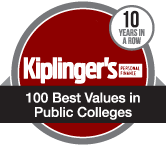College Catalog: 2015-2016
School of Theoretical and Applied Science (TAS): Engineering Physics (B.S.)
Website: School of Theoretical and Applied Science
The Engineering Physics major at Ramapo College is designed for students who like physics, have strong aptitude in it, and are interested and excited by the applied or engineering aspects of it. The Engineering Physics major is designed to offer students a broad theoretical and practical background providing a pivotal point for its graduates either to enter graduate school for further study and research or to pursue a professional career in private industry, government, or teaching.
Physics is known as the most fundamental of all sciences: it encompasses both the life sciences and the physical sciences. Physics is to the present what natural philosophy is to the past: it is at the root of every field of science. Engineering is the application of science in the design, construction, analysis of machines, processes or works for practical purposes. Engineering Physics is meant to provide a more thorough grounding in applied physics and it offers an unlimited scope of study and career opportunities in such areas as electronics, atomic, nuclear, and sub-nuclear physics, solid-state and low-temperature physics, optics, acoustics, relativity, quantum electronics, astrophysics, biophysics, and chemical physics, as well as a whole range of applied technology fields.
Advanced course offerings provide experience in electronics; mechanics, thermodynamics, electromagnetic theory and optics; relativity, atomic, and quantum theory; nuclear, sub-nuclear, and solid state physics; and computer science.
The faculty encourages and supports independent undergraduate research projects in computer studies, electronics, alternate energy sources and technologies, and optics. Facilities include well-equipped laboratories in electronics, advanced physics, computer science, instrumentation, optics, and a machine shop.
Majors in Engineering Physics are encouraged to take more than the minimum Requirements of the Major and to consider additional courses in microprocessors, computer modeling, energy system design, and mathematics, depending on their particular interests. There are also opportunities through cooperative education for students to gain credit and work experience in local industrial and research laboratories.
The major is offered by the School of Theoretical and Applied Science and leads to a B.S. degree.
Goal 1: Develop qualitative skills.
Outcome 1: Develop an integrated conceptual understanding of engineering physics concepts and demonstrate knowledge of the topics taught: Mechanics: § The Newton’s Laws § Two-dimensional and rotational motion § Energy (concepts of work and power) § States of matter – Thermodynamics § Energy in thermal processes § The laws of Thermodynamics – Waves § Frequency, amplitude and wavelength § Oscillations and motion of a pendulum § Sound – Electricity and Magnetism § Insulators and conductors § Electric fields and potentials § Current and resistance § Induced voltages and inductance § Direct and alternating current circuits § Magnets and electromagnetic waves – Light and optics § Dual nature of light § Reflection, refraction and diffraction of light § Transmission of light in optical fibers § Light sources, photodetectors and other opto-electronic devices § Theory of semiconductor devices – Advanced Physics § Relativity § Black body radiation § The photoelectric effect § Uncertainty principle § Radioactivity § Nuclear fusion and fission – Electronics § LRC Circuits § Transistors § Op amps Logic gates
Goal 2: Develop analytical / solving problem skills
Outcome 1: Develop analytical skills by demonstrating the ability of applying the acquired knowledge of the material to solve problems.
Goal 3: Develop interdisciplinary skills
Outcome 1: Apply acquired mathematical skills to solve engineering physics problems. Demonstrate proficiency in applying theoretical physics concepts to practical engineering applications.
Goal 4: Develop experiential laboratory / research skills
Outcome 1: Develop hands-on laboratory skills, including methods, data collection, error analysis, graphing and statistical methods. (Information Literacy)
Goal 5: Develop communication skills
Outcome 1: Write precise and concise scientific reports related to laboratory or research assignments. Display proficiency in providing an oral presentation of an engineering physics related field.
Goal 6: Develop cultural integration of scientific disciplines
Outcome 1: Learn about History and current developments in the fields of Engineering Physics. Develop an adequate understanding of scientific progress, the evolution of technology and the role of science and technology in modern society.
- Transfer students who have 48 or more credits accepted at the time of transfer are waived from the courses marked with a (W) below. Waivers only apply to General Education Requirements NOT School Core or Major Requirements.
- Double counting between General Education, School Core, and Major may be possible. Check with your advisor to see if any apply.
- Writing Intensive Requirement (six courses): three writing intensive courses in the general education curriculum are required: First Year Seminar, Critical Reading and Writing, and Readings in the Humanities; the other three courses are taken in the major.
- Not all courses are offered each semester. Please check the current Schedule of Classes for semester course offerings.
ENGINEERING PHYSICS MAJOR
- Subject & Course # – Title & Course Description
- GENERAL EDUCATION REQUIREMENTS
- INTD 101 - FIRST YEAR SEMINAR (W)
- SELECT ONE – (W) BADM 115 - PERSPECTIVES OF BUSINESS AND SOCIETY OR
- (W) SOSC 101 - SOCIAL ISSUES
- CRWT 102 - CRITICAL READING AND WRITING II
- AIID 201 - READINGS IN THE HUMANITIES (W)
- SELECT ONE – (W) GE-HISTORY CATEGORY: HIST 101-110
- SELECT ONE – GE-INTERCULTURAL NORTH AMERICA CATEGORY
- SELECT ONE – GE-INTERNATIONAL ISSUES CATEGORY
- SELECT ONE – (W) GE-TOPICS ARTS AND HUMANITIES CATEGORY OR
- (W) GE-TOPICS SOCIAL SCIENCE CATEGORY
- SCHOOL OF THEORETICAL AND APPLIED SCIENCE REQUIREMENT
- SCIENCE IN CULTURAL PERSPECTIVE COURSE LIST*: SELECT ONE
- AMER 307 - TECHNOLOGY AND CULTURE IN AMERICA
- ANTH 307 - MEDICAL ANTHROPOLOGY
- CNTP 315 - ART ON THE INTERNET
- COMM 307 - ENVIRONMENTAL WRITING
- ENST 215 - ENVIRONMENTAL HISTORY
- ENST 223 - ENERGY AND SOCIETY
- ENST 305 - ECOLOGY, ECONOMICS AND ETHICS
- ENST 312 - ECOLOGICAL ANTHROPOLOGY
- ENST 313 - APPROPRIATE TECHNOLOGY
- ENST 317 - ENVIRONMENTAL POLICY AND REGULATION
- HIST 396 - HIST OF SCIENTIFIC THOUGHT
- INFO 315 - COMPUTER LAW AND ETHICS
- LAWS 390 - TOPICS:
- MATH 441 - HISTORY OF MATH
- MGMT 324 - INVENTION FOR MANAGERS AND SCI
- PHIL 322 - PHILOSOPHY OF SCIENCE
- PHIL 328 - BIOETHICS
- PSYC 306 - ETHICAL AND LEGAL ISSUES
- PSYC 423 - HISTORY AND SYSTEMS OF PSYCHOLOGY
- SCIN 210 - SCIENCE, TECHNOLOGY, AND SOCIETY
- SCIN 230 - COMPUTERS AND SOCIETY
- SCIN 235 - HISTORICAL TRENDS IN NURSING
- SCIN 263 - SURVEY OF SCIENCE FICTION
- SCIN 310 - AIDS:BIOLOGICAL, MEDICAL, SOCIAL PERSPECTIVES
- SCIN 390 - TOPICS:
- SCIN 434 - WOMEN AND SCIENCE
- SOCI 230 - SOCIOLOGY OF HEALTH & MEDICINE
- * Please consult the School of TAS for the currently active courses which meet the SCP requirement.
- ENGINEERING PHYSICS MAJOR REQUIREMENTS
- CMPS 147 - COMPUTER SCIENCE I
- MATH 121 - CALCULUS I
- MATH 122 - CALCULUS II
- MATH 225 - MULTIVARIABLE CALCULUS
- MATH 305 - DIFFERENTIAL EQUATIONS
- PHYS 114 - PHYSICS I WITH CALCULUS: LECTURE AND LAB
- PHYS 115 - PHYSICS II WITH CALCULUS: LECTURE AND LAB
- PHYS 210 - MODERN PHYSICS: LECTURE AND LAB
- PHYS 240 - ELECTRONICS FOR SCIENTISTS I OR
- PHYS 242 - ELECTRONIC CIRCUITS & DEVICES
- PHYS 322 - ADVANCED MECHANICS
- PHYS 323 - ELECTRODYNAMICS I
- PHYS 350 - THERMODYNAMICS
- PHYS 422 - CONDENSED MATTER AND NUCLEAR PHYSICS
- PHYS 423 - QUANTUM MECHANICS I
- PHYS 431 - EXPERIMENTAL METHODS IN PHYSICS
- SELECT THREE:
- PHYS 241 - ELECTRONICS FOR SCIENTISTS II
- PHYS 250 - INTRODUCTION TO LABVIEW
- PHYS 324 - ELECTRODYNAMICS II
- PHYS 330 - SEMICONDUCTORS & OPTOELECTRONIC DEVICES
- PHYS 345 - ASTRONOMY & ASTROPHYSICS I
- PHYS 346 - ASTRONOMY & ASTROPHYSICS II
- PHYS 390 - TOPICS
- PHYS 424 - QUANTUM MECHANICS II
- PHYS 425 - ADVANCED TOPICS
- PHYS 426 - OPTICS
- PHYS 432 - PHOTONICS
- PHYS 435 - ADV EXP METH OPTICS/PHOTONICS
Note: A 2.0 GPA in the major is required for graduation.
- At least 1/2 of the courses fulfilling a minor must be distinct from the student’s major. That is, three of the six courses required for a minor cannot be used towards fulfillment of major requirements. A school core does not need to be completed for a minor. Minors are open to students regardless of school affiliation.
ENGINEERING PHYSICS MINOR
- Subject & Course # – Title & Course Description
- REQUIRED COURSES:
- PHYS 114 - PHYSICS I WITH CALCULUS: LECTURE AND LAB
- PHYS 115 - PHYSICS II WITH CALCULUS: LECTURE AND LAB
- PHYS 210 - MODERN PHYSICS: LECTURE AND LAB
- SELECT THREE:
- PHYS 240 - ELECTRONICS FOR SCIENTISTS I OR
- PHYS 242 - ELECTRONIC CIRCUITS & DEVICES
- PHYS 250 - INTRODUCTION TO LABVIEW
- PHYS 322 - ADVANCED MECHANICS
- PHYS 323 - ELECTRODYNAMICS I
- PHYS 330 - SEMICONDUCTORS & OPTOELECTRONIC DEVICES
- PHYS 345 - ASTRONOMY & ASTROPHYSICS I
- PHYS 346 - ASTRONOMY & ASTROPHYSICS II
- PHYS 350 - THERMODYNAMICS
- PHYS 390 - TOPICS
- PHYS 422 - CONDENSED MATTER AND NUCLEAR PHYSICS
- PHYS 423 - QUANTUM MECHANICS I
- PHYS 424 - QUANTUM MECHANICS II
- PHYS 426 - OPTICS
- PHYS 431 - EXPERIMENTAL METHODS IN PHYSICS
- PHYS 432 - PHOTONICS
- PHYS 425 - ADVANCED TOPICS
- PHYS 435 - ADV EXP METH OPTICS/PHOTONICS
General Education Requirements
Four Year Plan
Graduation Requirements
School of Theoretical and Applied Science Website
Faculty Profiles






